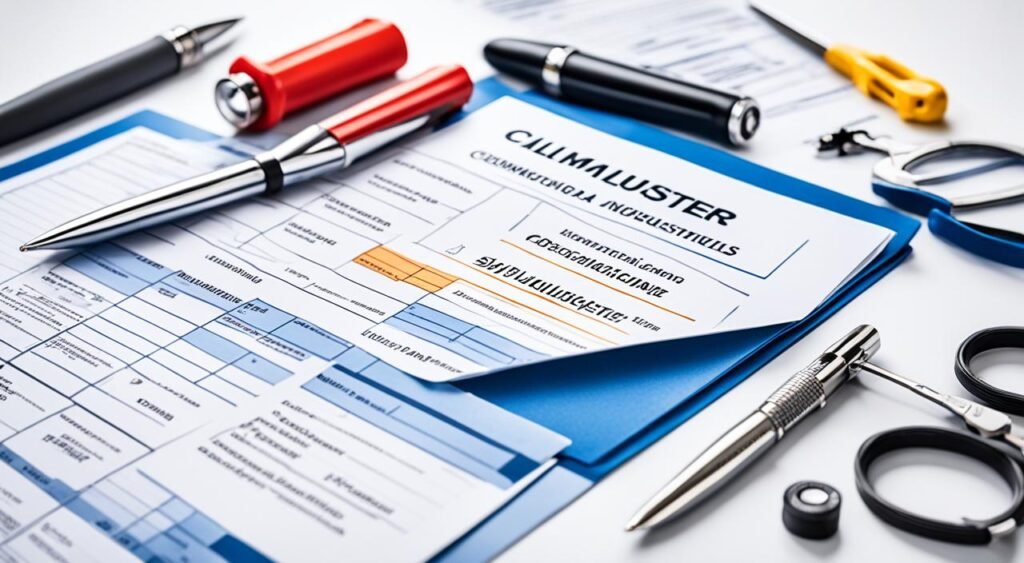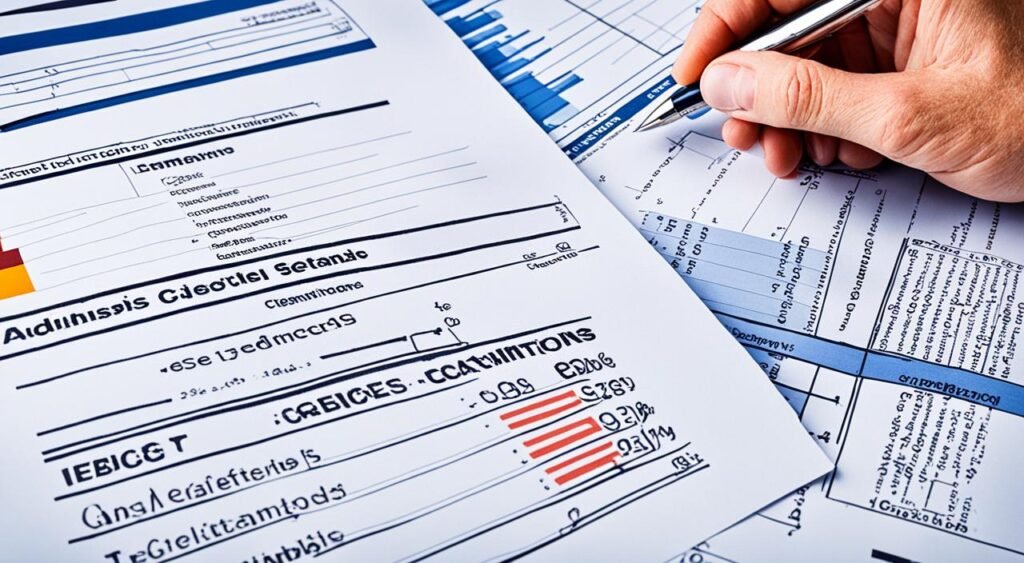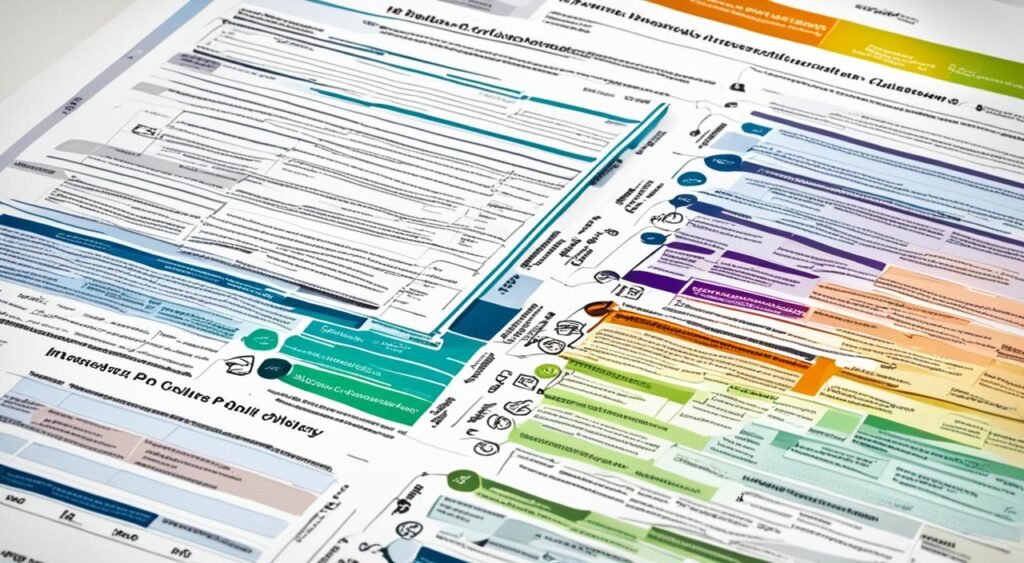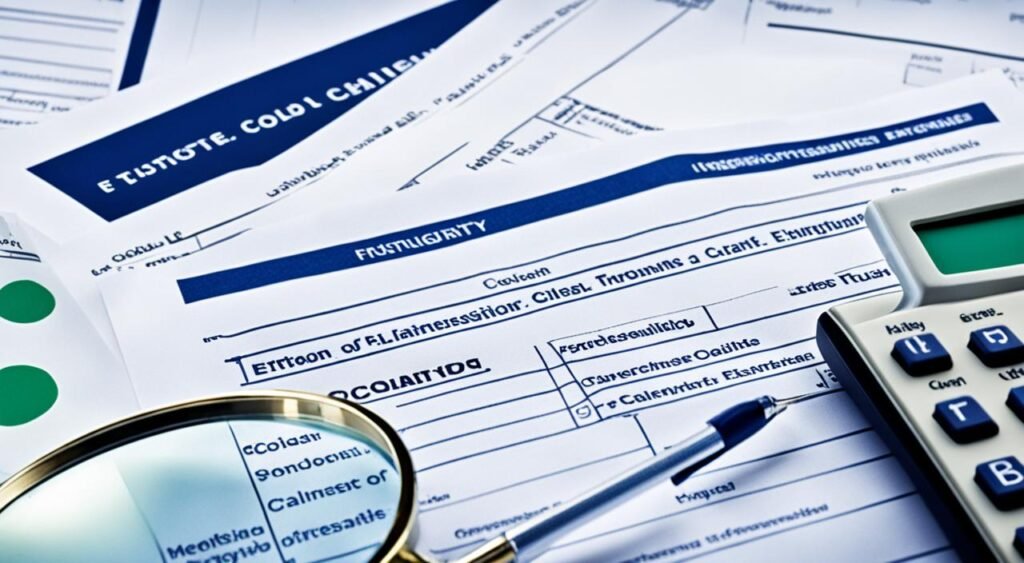Claims adjusters are vital in the insurance world. They connect policyholders and insurance companies. Their job includes checking property damage and looking into insurance claims. They decide on coverage and settlement amounts, needing many skills to do their job well.
Key Takeaways
- Claims adjusters must have strong investigative and analytical skills to thoroughly evaluate insurance claims.
- Excellent communication and customer service skills are essential for interacting with policyholders and claimants.
- Proficiency in insurance policy knowledge, including understanding policy provisions and coverage, which is crucial for claims adjusters.
- Having negotiation and settlement skills are necessary for adjusters to find fair solutions with policyholders.
- Multitasking and organizational abilities are vital for a claims adjuster to handle their job’s various tasks.
Claims Adjuster Role and Duties
A claims adjuster is in charge of looking into insurance claims. They check if the claim is valid and what the insurance should cover. Their work includes checking damage, talking to people, and settling claims fairly.
Inspecting Property Damage
When someone files a claim, the adjuster examines the damaged property. This could be a house, a shop, or a car. They look closely at the damage, make notes, and take photos. This careful look helps them figure out how much fixing it might cost. It also helps decide what the insurance can cover.
Investigating and Evaluating Claims
Adjusters don’t just look at the damage. They also check what happened before the claim. This means talking to the person who made the claim, getting statements from others, and looking at reports. All of this helps them see if the claim is fair. It’s important that the insurance policy covers everything correctly.
Determining Coverage and Settlements
After inspecting and investigating, adjusters decide on the coverage and how much to pay. They study the policy, consider the damage, and talk to the person with the claim. Their goal is to find an agreement that’s good for everyone. Understanding policies and being good at talking with people is key here.
Adjusters are important in the insurance field. They help people get the right compensation and look after the insurance company’s needs. Their careful work, smart thinking, and good talking skills make the claim process better for all.
Essential Skills for Claims Adjusters

For anyone working as a claims adjuster, having a wide range of essential skills is crucial. These skills help adjusters handle the many twists of the insurance world. They also ensure adjusters can give great service to people with insurance policies.
Being truthful and reliable is more than a must for claims adjusters; it’s fundamental. Adjusters need to be honest and make choices they can stand by. Their work involves big money and law-related decisions. They also need to be curious and smart about finding out details.
Good communication is key for a successful claims adjuster. They must talk to customers, people who have made claims, and others in a way that everyone understands. This means they must explain things clearly and with care. They also need to be good at figuring things out and paying close attention to important details.
- Integrity and dependability
- Inquisitiveness and resourcefulness
- Effective communication skills
- Investigative and analytical skills
- Attention to detail
- Math and software proficiency
- Organizational and time management skills
Having strong math skills is important for claims adjusters. They use these skills to figure out claim values. They also work a lot with special software, like Xactimate. Plus, being organized and good at doing many things at once helps them with their heavy workloads.
By building up a mix of claims adjuster, insurance, and other job skills, claims adjusters can do well in their work. They give great service to people with insurance and help the insurance industry do great things.
| Essential Skills for Claims Adjusters | Description |
|---|---|
| Integrity and Dependability | Maintaining the highest levels of honesty, ethics, and reliability in handling claims. |
| Inquisitiveness and Resourcefulness | Demonstrating a curious and investigative mindset to thoroughly explore each case. |
| Effective Communication | Possessing the ability to clearly and empathetically convey information to policyholders and other stakeholders. |
| Investigative and Analytical Skills | Adeptly analyzing policy coverage, assessing liability, and determining appropriate settlements. |
| Attention to Detail | Maintaining meticulous attention to detail to ensure accurate assessments and fair outcomes. |
| Math and Software Proficiency | Demonstrating strong numerical skills and the ability to utilize specialized claims processing software. |
| Organizational and Time Management | Exhibiting the capacity to effectively juggle multiple cases and prioritize tasks efficiently. |
By gaining a mix of essential claims adjuster, industry, and general professional skills, claims adjusters can become top-notch. They provide outstanding service to policyholders, helping the insurance industry as a whole succeed.
“The hallmark of a successful claims adjuster is a combination of integrity, inquisitiveness, and a relentless commitment to finding the truth and ensuring fair outcomes.”
Communication and Customer Service
For claims adjusters, being great at talking and helping people is key. They connect the insurance company with those making claims. This means they should be good at talking to all kinds of people calmly and nicely. They need to be patient, be understanding, and work with others well when handling claims and answering questions.
Interacting with Policyholders and Claimants
Adjusters should shine in talking to both policyholders and claimants. They need to gather details, explain what’s covered, and talk about settlements. Good communication means listening well, asking the right things, and explaining clearly. Being good at this builds trust, sets the right expectations, and makes customers happy.
Delivering Excellent Customer Service
Being great at customer service is very important for claims adjusters. They should understand and care about the concerns of those they work with. Tackling their issues effectively by being quick to respond, taking initiative, and focusing on solutions is critical. This all leads to happy customers, loyalty, and a good name for the insurance company.
“The key to being a successful claims adjuster is the ability to communicate effectively and provide exceptional customer service. It’s not just about processing the claim, but also about building trust and managing the expectations of policyholders and claimants.” – Jane Doe, Senior Claims Adjuster
Having strong skills in claims adjuster communication and customer service is a must in this field. By focusing on these, adjusters make the process smoother and more positive for everyone involved.
Investigation and Analysis

Claims adjusters play a key role in understanding insurance claims. They need to collect strong proof, take detailed statements, and check the insurance policy closely. This all helps in making fair and accurate decisions about claims.
Obtaining Evidence and Statements
Adjusters have to collect different types of proof like photos and witness statements. They also talk to experts to understand complex issues. This gathering of information helps them really know the claim.
Analyzing Policy Coverage and Liability
Understanding the insurance policy and who’s at fault is vital. They carefully check the policy to see what’s covered and what’s not. This, along with the evidence, helps them figure out the claim’s true worth.
Figuring out who’s to blame is part of their work too. They look at what happened and who might be responsible. This is critical to decide on fair claim settlements.
| Key Investigative Skills | Analytical Capabilities |
|---|---|
|
|
Claims adjusters use their investigation and analytical skills together. This allows them to review evidence, understand the policy, and decide on liability. It leads to just and well-thought-out claim solutions.
“The key to effective claims investigation is to leave no stone unturned. Adjusters must be meticulous in their evidence gathering and analysis to ensure the fairness and accuracy of their decisions.”
Claims Adjuster
Claims adjusters are key in the insurance world. They investigate, evaluate, and settle claims for insurance companies. Their tasks include looking into property damage, checking policy details, and making sure both parties are happy.
They carefully review insurance claims, gathering evidence and making decisions. They look into damaged property, understand policy terms, and set fair settlements. Claims adjusters need to be very detailed, good at analyzing, and great at talking to people involved.
Claims adjusters balance the needs of the insurance company and the policyholders. They must have awesome customer service to tackle tough situations. They bring empathy, patience, and professional knowledge to their job every day.
Claims adjusters also work closely with other insurance pros to spot trends and risks. This team effort helps companies make smart choices and manage risks well. Their work ensures customers get the full support they need.
The work of a claims adjuster is broad and challenging. They handle everything from checking damages to finalizing settlements, offering essential support to those in need.
| Key Responsibilities of a Claims Adjuster | Essential Skills for Claims Adjusters |
|---|---|
|
|
“As a claims adjuster, our job is to provide a fair and impartial assessment of the situation, ensuring that the policyholder’s needs are met while also protecting the interests of the insurance company.”
Claims adjusters are vital in the insurance world, needing a mix of skills. They keep the insurance process fair and help people when they need it most. Their expertise and efforts maintain the system’s trust and support people going through tough times.
Technology and Software Proficiency
Claims adjusters need to keep up with the latest technology to handle property damage claims. They use tools like Xactimate and mobile apps to work more efficiently. This helps them do their job better and keep clients happy.
Using Estimating Software like Xactimate
Xactimate is key to a claims adjuster’s work. It simplifies estimating and settling claims. This software lets adjusters measure damage, create detailed estimates, and work with others like contractors easily.
Its user-friendly design and powerful tools make estimating faster and more accurate. Adjusters can even sketch damage and manage the whole claim process better.
Leveraging Mobile Tools and Apps
Adjusters are now using mobile apps and tools outside the office. They can take photos of damage and use tools like laser meters easily. These help them document claims more quickly and with better accuracy.
Claims adjusters also have apps that let them make floor plans and access important policy info. This keeps them in touch with everyone involved, even when they’re not in the office.
Keeping up with claims adjuster technology and Xactimate helps adjusters do their job more efficiently. This leads to better accuracy and a great experience for anyone involved in a claim.
Insurance Policy Knowledge

Being a claims adjuster means knowing insurance policies inside and out. Understand all the language to know what’s covered. This helps make sure people get the right pay and understand their claims.
Understanding Policy Provisions and Coverage
Claims adjusters carefully read through insurance plans. They look at things like what’s not covered and how much the insurance pays. Knowing this helps to check if a claim is fair and make sure people get the coverage they should.
Interpreting Policy Language
Figuring out policy language is key for adjusters. They need to decode the legal words. This way, they can tell what’s covered and what’s not.
| Policy Provision | Description | Example |
|---|---|---|
| Deductible | The amount the policyholder must pay out-of-pocket before the insurance company covers the remaining costs. | A homeowner’s policy with a $500 deductible means the policyholder is responsible for the first $500 of a covered claim. |
| Limit | The maximum amount the insurance company will pay for a covered loss. | An auto insurance policy with a $100,000 liability limit will cover up to $100,000 in damages caused to another party. |
| Exclusion | Specific events or circumstances not covered by the insurance policy. | A homeowner’s policy may exclude coverage for damage caused by flooding or earthquakes. |
Understanding insurance policies helps adjusters guide people. They make sure policyholders get what they deserve from their insurance.
Negotiation and Settlement
Being a claims adjuster, a big part of your job is to reach fair deals with clients. Once a claim is okayed, it’s on you to talk it out with the client and close the deal. You need to be good at claims negotiation and claims settlement. Plus, know how to figure out the claim value and make sure everyone gets a fair deal.
Assessing Claim Value
First off, you must correctly figure out how much the claim is worth. To do this, look over what the policy covers and the damage or loss. Get all the info needed. You must be sharp about policy details. And know how to understand tricky policy wording to work out how much to pay.
Negotiating Fair Settlements
Once you know the claim’s value, it’s time to talk turkey with the client. Good communication and people skills are key. You’ve got to make a good case for the settlement. Handle any concerns or arguments from the client. And finally, find an agreement that works for both sides.
If the client doesn’t agree with your decision, you might have to call in legal help. This shows why it’s crucial to be a good negotiator. It helps you deal well with tough cases. And make sure things end fairly for everyone involved.
“Successful claims adjusters possess the ability to effectively negotiate with policyholders and their representatives to reach fair and equitable settlements that satisfy both the insurer and the claimant.”
By blending their skills in claim assessing and negotiation, adjusters make sure settlements happen smoothly. With everyone’s best interest kept in mind.
Claims Handling and Multitasking
As a claims adjuster, handling many things at once is key. You have to give great service, check things out well, and make smart choices. Keeping up with laws is a big deal to do this right and keep trust high.
Being great at multitasking makes a claims adjuster shine. They juggle lots of tasks, know what’s most important, and get everything done right and on time. It needs focus, good at sorting stuff out, and working well even when it’s busy.
| Key Skills for Effective Claims Handling and Multitasking |
|---|
|
“Multitasking is the ability to handle multiple claims simultaneously, prioritize tasks effectively, and complete each task efficiently. It’s a crucial skill for claims adjusters to master.”
By getting better at handling claims and multitasking, adjusters really help their customers. They make sure claims are processed right and help the whole insurance team do well.
Professionalism and Ethical Conduct

Being a claims adjuster means acting professionally and ethically every day. This job involves a lot of responsibility. We must make choices that matter, needing deep integrity, honesty, and ethical behavior.
Maintaining Integrity and Honesty
Experts say the top trait for a great independent claims adjuster is integrity. We need to always be honest and clear when talking with customers, people making claims, and those we work with in insurance. Good choices and keeping true to our word are key to being trusted and keeping the profession strong.
Adhering to Industry Regulations
As claims adjusters, we must stick to industry rules and guidelines. This means knowing and using insurance terms correctly, keeping detailed claim records, and following the insurance company’s rules. By following these ethical standards, we can show we’re professionals and keep our industry respected.
In short, being professional and ethical is crucial in claims adjusting. By always showing integrity, honesty, and following industry rules, claims adjusters handle their jobs with great care and responsibility.
“The number one characteristic of a successful independent claims adjuster is integrity.”
Also Read: The Impact Of An Indexed Universal Life Insurance Policy On Your Financial Future
Conclusion
In the world of insurance, claims adjusters play a crucial role. They use their smarts, talk well, and are very ethical. Claims adjuster skills help them succeed in their claims adjuster career and improve the whole industry.
They carefully look at the damage and check out claims thoroughly. This is key to making sure pay-outs are fair and correct. They work with complex policies, use the latest tech, and offer awesome service. This makes them super important to insurance companies and the people they insure.
The insurance field keeps changing, so we need more skilled and adaptable claims adjusters. This career is both demanding and rewarding. The future looks bright for those who are dedicated and have the right skills to lead the industry forward.
FAQs
What are the essential skills needed to become a successful claims adjuster?
To succeed, claims adjusters need many skills. These include honesty, curiosity, and being able to find what’s needed. They also need to be very careful and reliable. Skills like talking well, investigating, understanding problems, and using numbers are also key.
What are the primary duties and responsibilities of a claims adjuster?
A claims adjuster’s main job is to look into damage or injury claims. They check what’s covered by insurance and who’s at fault. Then, they talk to all sides to agree on a solution. Their work also involves making sure everyone is treated well.
How do claims adjusters communicate with policyholders and claimants?
Good communication is a must for claims adjusters. They need to talk clearly and kindly to people filing claims. This makes sure everyone gets the help they need. Being friendly and understanding also helps a lot.
What type of investigation and analysis skills are required for claims adjusters?
Claims adjusters have to be really good at looking into things. They gather proof, like photos and statements, to make sense of a case. Then, they work out what the insurance can do to help, based on the facts.
How do claims adjusters leverage technology and software in their work?
Technology is a big part of a claims adjuster’s job. They use special programs to figure out how much repairs cost. Apps on mobile devices help them stay organized and work faster. This is especially true when they’re out meeting people and checking damages.
What knowledge of insurance policies is required for claims adjusters?
Having a deep knowledge of insurance is crucial. Claims adjusters must understand what policies do and don’t cover. This lets them make fair decisions that follow the rules.
How do claims adjusters approach negotiation and settlement of claims?
Negotiation is something claims adjusters are really good at. They talk with everyone involved to find a fair solution. Their goal is to confirm claims are valid and agree on a reasonable outcome.
What challenges do claims adjusters face in handling multiple claims simultaneously?
Juggling many claims is not easy. They need to provide top-notch service, investigate, and make calls. Keeping up with legal changes is another challenge. But, they handle it well to ensure claims are managed the right way.
Why is professionalism and ethical conduct important for claims adjusters?
Being professional and doing the right thing is very important for claims adjusters. They decide on important matters and they are trusted to act fairly. Sticking to the rules and acting professionally is part of their duty.
